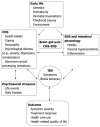Psychosocial determinants of irritable bowel syndrome
- PMID: 22363132
- PMCID: PMC3281218
- DOI: 10.3748/wjg.v18.i7.616
Psychosocial determinants of irritable bowel syndrome
Abstract
From a pure motor disorder of the bowel, in the past few years, irritable bowel syndrome (IBS) has become a multifactorial disease that implies visceral hypersensitivity, alterations at the level of nervous and humoral communications between the enteric nervous system and the central nervous system, alteration of the gut microflora, an increased intestinal permeability and minimum intestinal inflammation. Psychological and social factors can interfere with the communication between the central and enteric nervous systems, and there is proof that they are involved in the onset of IBS and influence the response to treatment and outcome. There is evidence that abuse history and stressful life events are involved in the onset of functional gastrointestinal disorders. In order to explain clustering of IBS in families, genetic factors and social learning mechanisms have been proposed. The psychological features, such as anxiety, depression as well as the comorbid psychiatric disorders, health beliefs and coping of patients with IBS are discussed in relation to the symptoms and outcome.
Keywords: Anxiety; Depressive symptoms; Irritable bowel syndrome; Personality; Psychosocial factors; Sexual abuse; Stressful events.
Figures
References
-
- Longstreth GF, Thompson WG, Chey WD, Houghton LA, Mearin F, Spiller RC. Functional Bowel Disorders. In: Drossman DA, Corazziari E, Delvaux M, Spiller RC, Talley NJ, et al., editors. Rome III: The Functional Gastrointestinal Disorders. 3rd ed. McLean, VA: Degnon Associates Inc; 2006. pp. 487–555.
-
- Drossman DA. Presidential address: Gastrointestinal illness and the biopsychosocial model. Psychosom Med. 1998;60:258–267. - PubMed
-
- Drossman DA. The functional gastrointestinal disorders and the Rome III process. In: Drossman DA, Corazziari E, Delvaux M, Spiller R, Talley NJ, et al., editors. Rome III: the functional gastrointestinal disorders. 3rd ed. McLean, VA: Degnon Associates Inc; 2006. pp. 1–30.
-
- Van Oudenhove L, Vandenberghe J, Demyttenaere K, Tack J. Psychosocial factors, psychiatric illness and functional gastrointestinal disorders: a historical perspective. Digestion. 2010;82:201–210. - PubMed
-
- Engel GL. The need for a new medical model: a challenge for biomedicine. Science. 1977;196:129–136. - PubMed
Publication types
MeSH terms
LinkOut - more resources
Full Text Sources
Other Literature Sources
Miscellaneous


